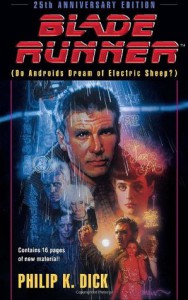Do Androids Dream of Electric Sheep?

In today's world, full of must-have (not for me though) gadgets and other electric appliances that might be as well alive - considering the way we tend to behave with them - this novel was really curious and enlightening read. What it means to be human - yes, really good question when you have androids whom you are supposed to mercilessly retire because of their breaking the first law of robotics (Asimov's actually, I believe), i.e. because of harming and escaping from their human owners. A person like Rick Deckard, a bounty hunter whose task was precisely that above mentioned, must at last wonder, what makes humans so more worthy and so different from their own creations.
This novel was not exempt from Philip K. Dick's infamous stances toward women. Oh no, I was stupefied more than once while reading it. But the whole concept of humanity and empathy versus sheer intelligence and ratio, mattered more, and Dick managed to superbly relay these issues through the interesting depiction of the various characters, but even better through the perspicacious interaction between them.
In this version of our near future (in my edition of the novel are still 90s though ;) Earth is totally devastated by nuclear war and the remaining humans started to measure their humanity and social status with tests of intelligence and empathy. The latter specifically helped Rick Deckard to identify androids that came to existence almost in the same time as the off-world colonization program. These artificial beings were every day more and more perfected to look and function like humans, and that troubled more and more Earth's police forces regarding android escapees. What was wrong with these tests was, that actually everybody, humans and animals, whether real or fake, 'wore' some kind of tag, price or social status. Those not conforming, were casted out and/or constantly humiliated, like J.R. Isidore whom we discovered wasn't too bright but had a heart of gold, or like androids, who might not have had hearts at all, but in some cases were in other ways more valuable than some human specimens. At first empathy seemed more fake than androids themselves, yet in the novel we soon discover why that concept was so important and why androids couldn't figure out the same, being thus dangerous not only to humans but, on further reflection, to themselves too.










